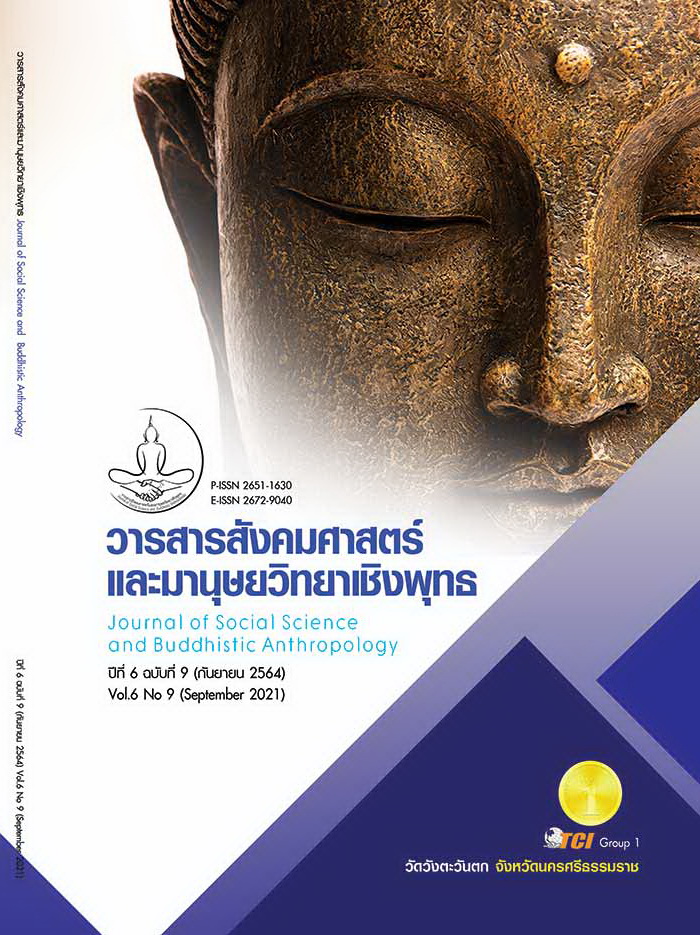A STUDY FACTORS OF POSITIVE COPING FOR NURSING STUDENTS UNDER THE MINISTRY OF DEFENSE
Keywords:
Positive Coping, Nursing Students, The Ministry of DefenseAbstract
The objectives of this research article were to study factors of positive coping for nursing students under the ministry of defense. The sample of this research was four hundred seventy-two for nursing students who studying in the Bachelor of Nursing Science Program under the Ministry of Defense, Year 1 - 4, to be students in 3 places including the Royal Thai Army Nursing College the Royal Thai Air Force Nursing College and the Royal Thai Navy College of Nursing. The research instrument used for the study was positive coping for nursing students under the ministry of defense. The instrument used for data collecting was the five-level-rating scale total forty items with an index of item-objective congruence score of 0.60 - 1.00 with discrimination of 0.24 - 0.73 and a reliability coefficient of 0.94. The statistic used to analyze data comprising of frequency, percentage, mean, standard deviation, and confirmatory factor analysis. The result of the research found that the measurement model of positive coping for nursing students was fit with empirical data ( = 1.83 df = 2 p = .39 GFI = 1.00 AGFI = 0.99 CFI = 1.00 RMSEA = 0.00 SRMR = 0.00). This shows that the model has the goodness of fit with the empirical data and when analyzing the confirmation element model, it was found that the factor of each, in descending order as follows: preventive coping (SC = 0.95) proactive coping (SC = 0.85) reactive coping (SC = 0.75) and anticipatory coping (SC = 0.55). Further research should bring the positive coping elements of the students of nursing students to develop a group counseling program. For the students in the Bachelor of Nursing Science to have more positive coping.
References
จิตรา สุขเจริญ และคณะ. (2563). ปัจจัยที่มีผลต่อความเครียดและการเผชิญความเครียดของนักศึกษา ในการฝึกปฏิบัติวิชาปฏิบัติหลักการและเทคนิคการพยาบาล วิทยาลัยพยาบาลบรมราชชนนี ชลบุรี. วารสารวิจัยทางวิทยาศาสตร์สุขภาพ, 14(3), 107-118.
ชุติมา อนันตชัย และคณะ. (2555). การศึกษาสาเหตุระดับความเครียดและการเผชิญความเครียดในการฝึกภาคปฏิบัติของนักศึกษาพยาบาลมหาวิทยาลัยวงษ์ชวลิตกุล. วารสารวิชาการมหาวิทยาลัยวงษ์ชวลิตกุล, 1(1), 15-22.
ทัศนา ทวีคูณ และคณะ. (2556). ปัจจัยทำนายความเครียดของนักศึกษาพยาบาลศาสตรมหาบัณฑิต. วารสารพยาบาลกระทรวงสาธารณสุข, 22(3), 1-11.
บุญชม ศรีสะอาด. (2538). วิธีการทางสถิติสำหรับการวิจัย. (พิมพ์ครั้งที่ 2). กรุงเทพมหานคร: สุวีริยาสาสน์.
เบญจวรรณ วงศ์ปราชญ์. (2561). ปัจจัยที่มีความสัมพันธ์กับความเครียดและการเผชิญความเครียดของนักเรียนพยาบาล วิทยาลัยพยาบาลกองทัพบก. วารสารพยาบาลทหารบก, (19)2, 201-210.
ปวีณา นพโสตร และคณะ. (2561). ปัจจัยคัดสรรที่มีความสัมพันธ์กับความแข็งแกร่งในชีวิตของนักศึกษาพยาบาลมหาวิทยาลัยในกรุงเทพมหานคร. วารสารคณะพยาบาลศาสตร์ มหาวิทยาลัยบูรพา, 26(2), 1-10.
พิไลพร สุขเจริญ และรภัทรภร เพชรสุข. (2559). กระบวนการส่งเสริมความสามารถในการปฏิบัติการพยาบาลพื้นฐานของนักศึกษาพยาบาล ชั้นปีที่ 2 มหาวิทยาลัยสวนดุสิต. วารสารมหาวิทยาลัยคริสเตียน, 22(1), 6-8.
พูลพงศ์ สุขสว่าง. (2556). โมเดลสมการโครงสร้าง. กรุงเทพมหานคร: วัฒนาพาณิช.
มยุรี ยีปาโล๊ะ และคณะ. (2561). สภาพการณ์และความต้องการในการเตรียมความพร้อมเพื่อสอบขึ้นทะเบียนฯ รายวิชาการพยาบาลเด็กและวัยรุ่นของนักศึกษาพยาบาลวิทยาลัยพยาบาลบรมราชชนนี ยะลา. วารสาร อัล-ฮิกมะฮฺ มหาวิทยาลัยฟาฏอน, 8(16), 135-143.
ยุพาพร หอมสมบัติ และคณะ. (2561). แนวทางการจัดการความเครียดของนักศึกษาพยาบาลชั้นที่ 2 ในการขึ้นฝึกภาคปฏิบัติครั้งแรก. วารสารวิทยาศาสตร์สุขภาพ วิทยาลัยพยาบาลบรมราชชนนี สรรพสิทธิประสงค์, 2(3), 48-62.
วัลภา ศรีบุญพิมพ์สวย และคณะ. (2559). ความเครียดและการเผชิญความเครียดก่อนการขึ้นฝึกปฏิบัติแผนกห้องคลอดของนักศึกษาพยาบาลศาสตร์ ชั้นปีที่ 3 วิทยาลัยพยาบาลบรมราชชนนี อุดรธานี. วารสารวิชาการมหาวิทยาลัยการจัดการและเทคโนโลยีอิสเทิร์น, 13(2), 30-38.
สมโภชน์ เอี่ยมสุภาษิต. (2562). ทฤษฎีและเทคนิคการปรับพฤติกรรม. (พิมพ์ครั้งที่ 9). กรุงเทพมหานคร: จุฬาลงกรณ์มหาวิทยาลัย.
สฤษฎ์กานต์ สิทธิไกรวงษ์ และมนัสนันท์ หัตถศักดิ์. (2557). ผลของโปรแกรมกิจกรรมกลุ่มเพื่อนพัฒนาผู้เรียนที่มีต่อความเครียดและการปรับตัวในการเรียนของนักเรียนพยาบาลทหารอากาศชั้นปีที่ 2 วิทยาลัยพยาบาลทหารอากาศ กรมแพทย์ทหารอากาศ. วารสารวิชาการศรีปทุม ชลบุรี, 10(3), 65-71.
สิริทรัพย์ สีหะวงษ์ และคณะ. (2561). ปัจจัยที่ส่งผลต่อความเครียดของนักศึกษาคณะพยาบาลศาสตร์ มหาวิทยาลัยอุบลราชธานี. วารสาร มฉก.วิชาการ, 22(42), 103-104.
สุวรรณา เชียงขุนทด. (2562). การพัฒนาโปรแกรมการจัดการความเครียดตามแนวพุทธจิตวิทยาสำหรับนักศึกษาคณะพยาบาลศาสตร์ มหาวิทยาลัยสยาม. วารสารบัณฑิตศึกษาปริทรรศน์, 15(1), 184-195.
อังคณา สุเมธสิทธิกุล และคณะ. (2562). รูปแบบการพัฒนาอัตลักษณ์ของนักเรียนพยาบาล วิทยาลัยพยาบาลกองทัพบก. วารสารพยาบาลตำรวจ, 11(1), 184-197.
อิสริยา รักเสนาะ และคณะ. (2561). ความรู้ ทัศนคติ และการรับรู้สมรรถนะแห่งตนในการดูแลผู้ป่วยระยะสุดท้ายของนักเรียนพยาบาลทหาร สังกัดกระทรวงกลาโหม ชั้นปีที่ 4. วารสารพยาบาลทหารบก, 19(Supplement), 242-250.
Noorbakhsh, N. et al. (2010). Emotional intelligence and coping styles with stress. Procedia-Social and Behavioral Sciences, 5(1), 818-822.
Aitken, A. & Crawford, L. H. (2007). Coping with stress: Dispositional coping strategies of project managers. International Journal of Project Management, 25(7), 666-673.
Compton, E. A. (2011). Neural and behavioral measures of error-related cognitive control predict daily coping with stress. PubMed, 11(2), 379-390.
Davis, C. G., et al. (1998). Making sense of loss and benefiting from the experience: Two construals of meaning. Journal of Personality and Social Psychology, 75(2), 561-574.
Greenglass, E. & Frydenberg, E. (2002). Beyond coping: Meeting goals, visions, and challenges. London: Oxford University Press.
Lazarus, R. S. & Folkman, S. (1984). Stress appraisal and coping. New York: Springer Publishing.
Schwarze, R. & Knoll, S. (2007). Positive coping: Mastering demands and searching for maining. In Handbook of Positive Psychological Assessment. Washington, DC: American Psychological Association.
Schwarzer, R. (1999). Positive coping: Mastering demands and searching for meaning Positive Psychological assessment, A handbook of models and measures. Washington DC US: American Psychological Association.









